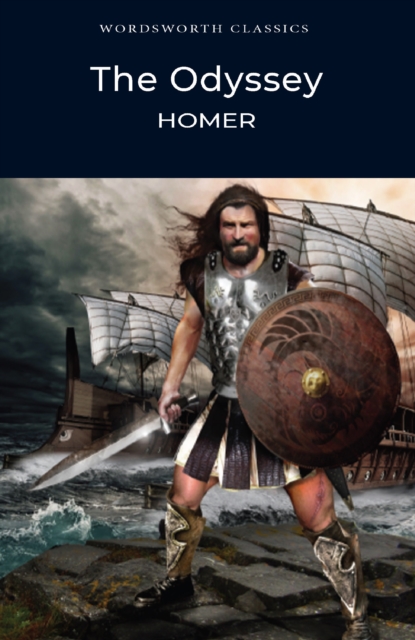“Doth that course make me yet; for there some strife,
Strength, and my spirit, may make me make for life.”
Synopsis
The Odyssey is a classic and well-known epic poem, divided into 24 segments and commonly attributed to the ancient Greek poet Homer. It was traditionally performed orally and may not have originally been structured the way we read it today. It also doesn’t follow a linear timeline, which is important to know if you’re giving this epic a go!
The reader begins in the middle of the story, learning about earlier events through Odysseus’ own retellings, guided by the muse. The first four “books” set the scene in Ithaca, where Odysseus’ wife and son, Penelope and Telemachus, are being terrorised by suitors who have invaded their home and are abusing the laws of xenia (hospitality). Throughout the 24 books, Homer lays out many of the key themes that I’ll be examining in this review.
If this classic tale of homecoming and heroism speaks to you, find it here:
Hero’s ego, hubris
In Aristotle’s plays, hubris or excessive pride—often leads to the downfall of the protagonist, and Homer’s Odyssey is no different. Homer demonstrates this through Odysseus’s constant taunting of the gods. This is reflected in the lines:
[…] Falling is my house,
Which you should shame to see so ruinous.
Reverence the censures all good men give,
That dwell about you; and for fear to live
Exposed to heaven’s wrath (Book II, ll-4-8)
This emphasises that the sufferings of his family and even Odysseus himself are caused by his pride. Homer’s depiction of Odysseus as “wise” and “divine” is rooted in tales of his victorious siege of Troy, but it also reinforces the hero’s ego throughout his nostos (the epic hero’s journey home).
Throughout the hero’s epic journey, there are several references to the “Muse” through which Odysseus’ story is told. The epic opens with the lines:
“The Man, O Muse, inform, that many a way / Wound his wisdom to his wished stay;”
This could be interpreted as Odysseus’ pride being so excessive that he’s unable to share his own emotions—it must be told through a Muse. On the other hand, Homer’s use of the Muse may simply reflect tradition, emphasising the cultural importance of Odysseus’s nostos, with his stories passed down through these traditional figures.
Most importantly to the story within the epic poem, it is Odysseus’s pride that causes the interference of the Gods. The punishments he faces throughout the epic are largely due to his own arrogance and his deliberate disobedience of the orders he’s been given. One of the most notorious examples of this display of ego is in Book IX, when Odysseus and his crew escape the Cyclops Polyphemus. After blinding the Cyclops, Odysseus boasts:
Cyclop! If any ask thee, who impos’d
Th’ unsightly blemish that thine eye enclos’d
Say that Ulysses, old Laertes’ son,
Whose seat is Ithaca, and who hath won
Surname of city-raser, bored it out.
This moment clearly illustrates Odysseus’ pride. After previously mocking the Cyclops by claiming his name was “No-Man,” he cannot resist revealing his true identity to be seen as a worthy hero—the one capable of taking down a Cyclops. It’s a clear sign of his egotistical behaviour, which leads to his continued punishment and delays his journey home.
Vision, concealment, deceit
Another aspect of the blinding of the Cyclops I found interesting was the theme of concealment and vision. As part of Cyclopean legend, the creatures have only one eye—so Odysseus completely strips Polyphemus of his ability to see. Homer describes the event as somewhat victorious, which fits the tale of an epic hero and the often glamourised or romanticised violence of men in mythic stories. This blinding is described in the lines:
A spirit beyond the spirit they us’d to have;
Who took the olive spar, made keen before,
And plung’d it in his eye, and up I bore,
Bent it to the top close, and help’d pour it in,
With all my forces. (Book IX, ll.52-8)
Not only is the action described in a surprisingly gory way, but also animalistically. The phrase “a spirit beyond the spirit they us’d to have” could refer to the imagery of a “savage” human—someone acting on raw instinct. Thus, the blinding is presented as almost natural for a soldier, a hero.
Vision, concealment and deceit are also exhibited through the goddess Athena, who aids Odysseus throughout his journey. Across the epic, Athena disguises herself as Mentes to impart knowledge, intervening in Odysseus’ fate when necessary, while still allowing him to earn his victory and fulfil his destiny. This is highlighted in the line: “Yet did divine Ulysseus keep his roof, and with Minerva plotted still the proof,” where Homer clearly emphasises the Gods’ interference in Odysseus’ journey. Whether it’s Poseidon punishing him or Athena supporting him, divine influence is ever-present.
Through his journey, Odysseus also gains perspective—in other words, he “opens his eyes” to the world around him and returns to Ithaca with a changed mindset. Disguised as a beggar, he witnesses first-hand how manipulative and arrogant the suitors have become. Instead of using violence prematurely, Odysseus, with Athena’s help, uses his cunning to take them down once they’re intoxicated:
[…] ask what use
Your mind will give them, say, ‘tis their abuse
With smoke and rust that makes you take them down,
This not being like the armory well known
[…]
The ready weapon, when the blood is up,
Doubles the uproar heighten’d by the cup.
(Book XIX ll.11-26)
Utilising this knowledge and his wits, Odysseus and Telemachus plan their revenge against the suitors, slaughtering them by surprise. His use of disguise allows him to sit among them and learn more. It also presents them the chance to uphold xenia—offering the beggar food and shelter, something they themselves have been abusing during their stay in Ithaca. But they refuse him: “[…] why should they mistake / Their own rich humours for a beggar’s sake.” Therefore, with this refusal to conform to the rules of xenia, working alongside the gods, Odysseus punishes the arrogant wooers of Penelope.
Women and Idealisation
Although The Odyssey is told as the tale of a heroic man, women play a significant role throughout the poem—including the narrating Muse. This could suggest that, due to the patriarchal values of ancient Greek society and the societal expectations placed on masculinity, Odysseus cannot speak openly about his emotions without risking being seen as “less manly.”Alternatively, Homer’s use of the Muse may simply serve to elevate the importance of Odysseus’s story. This is reinforced through the repeated use of the adjective “wise” to describe him. The opening line: “The Man, O Muse, inform that many a way / Wound with his wisdom to his washed stay;”—immediately establishes Odysseus as a wise and strong hero, a description echoed throughout his journey.
As the wife of the titular hero, Penelope embodies the traits of the “ideal woman”— she is virtuous, loyal, and patient, even when it seems Odysseus is dead. She is also cunning, never falling for the disguise Odysseus adopts upon his return. She challenges both him and the suitors with the test of stringing a difficult bow—a feat she knows only Odysseus can accomplish. In the end, her patience is rewarded with the return of her husband and the restoration of the family unit.
Penelope is notably contrasted with the servant women of Ithaca, whom Odysseus slays, believing them guilty by association for sleeping with the suitors. Homer writes: “Recount, then, to me those licentious dames / That lost my honour and their sex’s shames,” (Book XXII, ll.538-9). This line shows how, in Odysseus’ eyes, their betrayal and sexual impurity justify their execution, which heavily contrasts to Penelope’s purity and loyalty. Homer further reinforces Penelope’s virtue in Book I:
“Of wise Penelope, Icarius’ seed,
[…]
She stood, in shade of graceful veils implied
About her beauties” (Book I, ll. 499-508)
This presents Penelope as both beautiful and wise—mirroring the same traits often used to describe Odysseus, and subtly highlighting their compatibility.
Power, Control and Calypso
Calypso’s interpretations vary, but my reading of the nymph is that of an abuser. She holds Odysseus captive on the island of Ogygia and forces him into a sexual relationship, making him a victim of rape. This is potentially highlighted in the lines:
“Sev’n years she made me lie; and there spent I
The long time, steeping in the misery
Of ceaseless tears the garments I did wear
From her fair hand” (Book VII, ll. 363-6)
Describing this as a time of “misery,” along with earlier references to her as “Dreadful Calypso,” suggests a lack of consent and implies that Odysseus is being sexually violated. In Greek mythology, there are many stories where figures of power, whether human or divine, exploit those beneath them—and The Odyssey is arguably an example. This reading also offers an alternative reason why Odysseus doesn’t narrate the entire story himself: the trauma inflicted by Calypso has silenced him. The story being told through the Muse could be interpreted as a way of lifting that silence and acknowledging the stigma male rape victims still face.
Final Thoughts
Going into The Odyssey, I was highly apprehensive—what more could I possibly add to the conversation about this epic poem? I was worried about how I would handle the classical language, but I was pleasantly surprised at how accessible I found my edition. There were moments where I would have to re-read certain passages or refer to summaries to make sure I fully understood everything, but the more invested I became in the story, the more it all started to make sense.
At its core, The Odyssey is a story of determination and the inner strength needed to face hardship. Odysseus’s journey could be seen as symbolic of a mental health struggle, or the journey of life in general—his perseverance is what ultimately brings him back to the shores of Ithaca… with a little divine interference, of course.
Overall, reading this epic was an interesting experience. Being a long and dense poem, there were definitely parts where I hit a slump and had to push through. With all this in mind, I give it a really good four star rating!
Have you read this book?
We would love to hear your thoughts on this book, perhaps you agree with our review, or, disagree?





